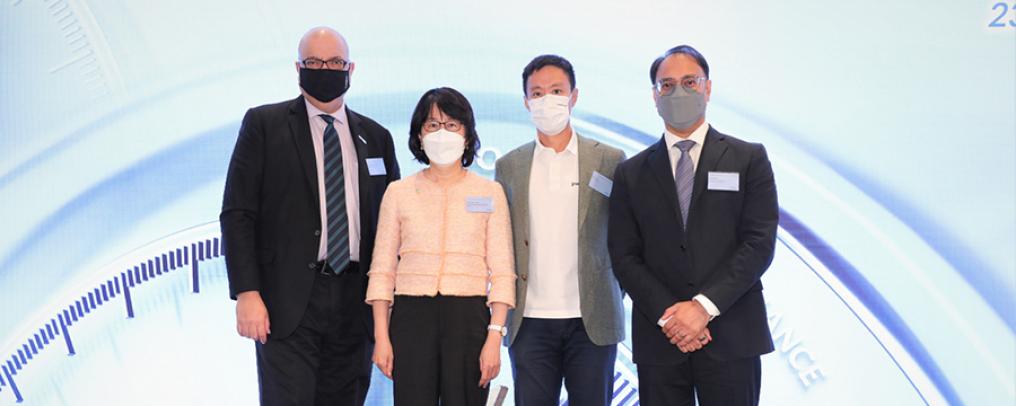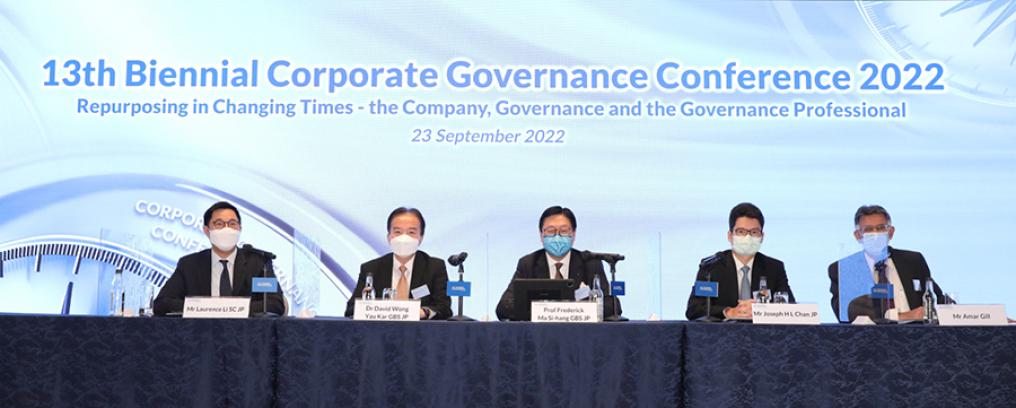
Company law guidance notes – Share buy-backs and convening a meeting when shareholders are in dispute
CGj overviews two guidance notes issued by the Institute’s Company Law Interest Group – on share repurchases and calling a general meeting when there are disputing shareholders – which, while covering very different topics, are of equal relevance to the governance professional.
As an integral part of the Institute’s thought leadership and professional development initiatives, its seven Interest Groups issue a wide range of guidance notes to help the governance professional stay fully apprised of all the latest developments in various aspects of corporate governance.
In its sixth guidance note, published in March 2022, the Institute’s Company Law Interest Group seeks to unravel the complexities of the Companies Ordinance (Cap 622) in relation to share repurchases by a Hong Kong company, while its seventh guidance note, issued in June 2022, provides clear advice on convening a general meeting when shareholders are in dispute.
Share repurchase by a Hong Kong company
The topic of the sixth guidance note – summarising the requirements for carrying out a share repurchase (also known as a ‘share by-back’) under Cap 622 and the regulatory aspects of implementing a share repurchase – is a valuable reference for governance professionals, directors and senior managers when considering whether or not to take this step.
Reasons for share repurchase
The guidance note lists six distinct reasons why a share repurchase might be considered:
- to return surplus cash to shareholders, which is one of the principal reasons for a listed company to purchase its shares
- to increase earnings per share or net assets per share
- to facilitate an exit route of a shareholder from a company via a restricted share transfer
- to purchase shares issued to an employee under an employee incentive scheme when that employee ceases to be employed by the company
- to adjust the level of debt to equity, and thus increase the company’s gearing, and
- to give shareholders an exit route in the event of an intended delisting.
Principles of share buy-backs
Under Cap 622, share buy-backs are subject to restrictions in the company’s articles of association, and must not result in there being no shareholder of the company holding shares other than redeemable shares. In addition, any shares bought back must be fully paid shares, must be paid for on buy-back and must be cancelled at that time.
Requirements for listed companies
The Companies Ordinance delineates the requirements for share repurchases by a Hong Kong listed company, which is also subject to the Rules Governing the Listing of Securities on The Stock Exchange of Hong Kong Ltd (Listing Rules), the Takeovers Code and the Share Buy-Back Code. The requirements under the Companies Ordinance are as follows:
- By way of a general offer. As the guidance note explains, repurchase of shares by way of a general offer is the most complex and regulated method. It needs to be pre-approved by a shareholders’ ordinary resolution. If 90% of the shareholders accept the offer, resulting in the compulsory disposal of shares of the remaining shareholders, then such an offer must be authorised by special resolution (at which no non-tendering shareholder may vote) and an independent investment adviser must be appointed to advise the shareholders affected by the compulsory disposal on the merits of the offer, backed up by specific documentation.
- On a recognised stock market or approved stock exchange. This is the most common and straightforward form of share repurchase. However, a listed company opting for this route is prohibited from making a payment out of capital.
- Under contract authorised in advance. This off-market repurchase is a private contract between the company and one or more shareholders, and is not conducted on a stock market. The guidance note explains the precise terms and conditions of such a share buy-back scenario.
Requirements for unlisted companies
An unlisted company can buy back its own shares only under a contract that is authorised in advance by special resolution. Detailed provisions regulating the disclosures of a proposed contract, and what documentation is required if a special resolution is proposed at a general meeting, are prescribed under the Companies Ordinance. The resolution will be invalidated if the votes of an interested shareholder result in the passing of the resolution.
Share repurchase payment methods
Under the current Companies Ordinance, the traditional position originally established under the old Cap 32 that share buy-backs must generally be financed out of distributable profits or the proceeds of the new issue of shares has been retained. However, a key change in Cap 622 is that now all companies, whether listed or not, can fund buy-backs out of capital, subject to a solvency test, regardless of whether there are sufficient distributable profits or proceeds of a fresh issue. The only exception to this, as mentioned above, is for a listed company opting to repurchase its own shares on a recognised stock market or approved stock exchange.
Companies wishing to make a payment out of capital to fund a share buy-back must adhere to the following procedures.
- Solvency statement: all directors must sign a solvency statement in a specified form.
- Special resolution: payment out of capital must be approved via a shareholders’ special resolution, which must be passed within 15 days after the date of the solvency statement.
- Notice of payment out of capital and inspection of documents: the company must publish a notice about the payment out of capital in the HKSAR Government Gazette (published every Friday) within a defined time frame, plus a notice in both Chinese and English newspapers or give written notice to all creditors of the company, also within a defined time frame. The special resolution and the solvency statement must be available for inspection by shareholders and creditors for five weeks.
- Application to the court by shareholders or creditors: within five weeks of the date on which the special resolution is passed, any creditor or non-approving shareholder may apply to the court for cancellation of the resolution. For any such application, the company must inform the Companies Registry within seven days from the date of application. The court has the right to confirm or cancel the special resolution for payment out of capital as it thinks fit.
- Registration of court order: the company must deliver an office copy of any court order to the Companies Registry within 15 days after the court has made its order.
- Timing for payment out of capital: if there is no impediment to doing so, payment out of capital and the share buy-back must be made between five and seven weeks after the date of the special resolution.
Share buy-back out of capital by a private company
Private companies wishing to repurchase shares out of capital must fulfil certain requirements. The guidance note sets out these requirements and presents a handy step-by-step guide for proper implementation.
Convening general meetings with disputing shareholders
The seventh guidance note issued by the Institute’s Company Law Interest Group is designed to assist governance professionals who find themselves in the unfortunate position of having to deal with disputing shareholders, notably with regard to the convening of general meetings by Hong Kong incorporated companies. The guidance note also provides useful references to the applicable statutory rules and procedures under the Companies Ordinance, which must be fully complied with. Furthermore, to enhance the knowledge and understanding of those dealing with such a situation, several real-life case studies relating to a disputing member’s requisition to propose a resolution to remove a director are discussed.
Convening a general meeting
As this guidance note explains, when convening a general meeting, the governance professional will need ‘to get back to basics’, particularly when shareholders are in dispute. Part 12, Division 1, Subdivision 4 (notably sections 565 to 570) of the Companies Ordinance contains everything necessary for understanding the statutory rules and procedures for convening a general meeting, which could be called by ‘different camps of a dispute, seeking to oust the other’s directors’. The governance professional will not only need to refer to these specific provisions for compliance purposes, but will also need to refer to the company’s own articles of association and other relevant documents, such as the shareholders’ agreement and service contract where removal of a director is involved.
The guidance notes further advises that alternative solutions – such as negotiation, mediation or buyout – should be put forward for consideration, in the event that a dispute cannot be resolved at a general meeting, as being simpler and less costly than bringing an action to court.
A general meeting can be called by the directors, in which case the governance professional must have proper authorisation from the board before sending out a notice to call a general meeting, or by members representing at least 5% of the total voting rights by way of a request to the company.
Directors’ duty on members’ request to call a general meeting. The guidance note reminds governance professionals that, if the directors receive a request from a member to call a general meeting, they need to advise the directors that they must convene a general meeting – except in very particular circumstances – within 21 days after the request is received, and that the meeting must be held on a date not more than 28 days after the date of the notice convening the meeting.
Members’ rights to convene a general meeting consequent on directors’ failure. Further, the guidance note reminds the governance professional of the need to advise the directors that, should they fail to convene a general meeting:
- the members who requested the general meeting, or any of them representing more than 50% of their total voting rights (that is, at least 2.5% of the total voting rights of all members) may themselves call a meeting, and
- the general meting must be called for a date not more than three months after the date on which the directors become subject to the requirement to call a meeting.
The necessary quorum, as well as the timeline for holding a general meeting requested by members, is detailed in the guidance note, which states that ‘if the directors fail to convene a general meeting upon members’ requisition, and the members forthwith proceed to convene a general meeting, the proposed resolution may be validly passed at a general meeting held at least 38 days from the date of the member’s request, up to a maximum of three months’.
Power of the court to order a general meeting. In situations where it is impractical to call a general meeting in the usual way, or to conduct the meeting in the manner prescribed by the company’s articles or the Companies Ordinance, the court may, either of its own motion or on application by a director or member of a company, order a general meeting to be held. However, as the guidance note reminds us, ‘the governance professional should note that the court is generally reluctant to interfere in a company’s decision-making process unless, in the circumstances, it is impracticable to call a meeting’.
Notice of a general meeting
The rules governing the notice required of a general meeting are defined in Part 12, Division 1, Subdivision 5 of the Companies Ordinance. The governance professional needs to be familiar with these rules, notably sections 571 to 575 and section 578, as these are particularly relevant in a dispute situation.
Period of notice. Under the Companies Ordinance, in the case of a limited company, a general meeting, other than an adjourned meeting, a period of 21 days’ notice must be given for an annual general meeting and 14 days for all other meetings, while for an unlimited company, seven days’ notice is required. However, if a company’s articles require a longer notice period, then that takes precedence. The required number of days’ notice must be clear calendar days, exclusive of the day of service and the day of the meeting. For a listed company, members must be given reasonable written notice, which is generally assumed to be 21 days for an annual general meeting and 14 days for other general meetings.
Service of notice. Notice of a general meeting must be provided in hard copy or electronic form, or by uploading the notice to a website, or a combination of both. If a company chooses the website option, then members have to be informed of the availability of the notice, which must be available throughout the period from the date of notification to the conclusion of the meeting. A listed company must, in addition, adhere to the Listing Rules when publishing a notice of a general meeting, simultaneously dispatching a circular to its shareholders and providing them with any relevant information not less than 10 business days (on which a recognised stock market is open) before the date of the meeting. Where there is a dispute situation between shareholders, it would be prudent for a governance professional to send the notice of the meeting to members by both email and post to their registered address.
Who is entitled to receive notice. Under the Companies Ordinance, notice of a general meeting must be provided to every director and to every member of the company who is entitled to attend and vote, except in the case of a listed company where such notice must also be given to every member not entitled to vote at the meeting. If notice of a general meeting, or any other document relating to the meeting, is required to be given to a member, the company must simultaneously give a copy to its auditor/s.
Special notice
The guidance note also outlines when special notice is required to be given of a resolution, and explains that notice of the intention to move the resolution must be given to the company at least 28 days before the meeting at which the resolution is moved, without which the resolution is not effective. In this, as in all other issues related to convening a general meeting, governance professionals are strongly advised to familiarise themselves with all statutory rules and procedures laid down under the Companies Ordinance, as well as any provisions under the company’s articles and other relevant documents.
The guidance notes reviewed in this article are available under the Thought Leadership section of the Institute’s website: www.hkcgi.org.hk.
SIDEBAR: Credits
The Institute would like to thank the members of its Company Law Interest Group: Benita Yu FCG HKFCG (Chairman), Angela Mak FCG HKFCG, Cathy Yu FCG HKFCG, Loretta Chan FCG HKFCG, Caron Lee FCG HKFCG and Wendy Yung FCG HKFCG. Gratitude is expressed to Benita Yu FCG HKFCG, Partner, Slaughter and May, as author of the sixth guidance note, with the contribution of April Chan FCG HKFCG, Past President and Chairman, Institute Technical Consultation Panel, and Mohan Datwani FCG HKFCG(PE), Institute Deputy Chief Executive; and to Cathy Yu FCG HKFCG, Head of Company Secretarial Department, King & Wood Mallesons, as author of the seventh guidance note in this series.
Institute Deputy Chief Executive, Mohan Datwani FCG HKFCG(PE), serves as Secretary to the Institute’s Interest Groups. If you have any comments and/or suggestions relating to the Institute’s Interest Groups, he can be contacted at: mohan.datwani@hkcgi.org.hk.


